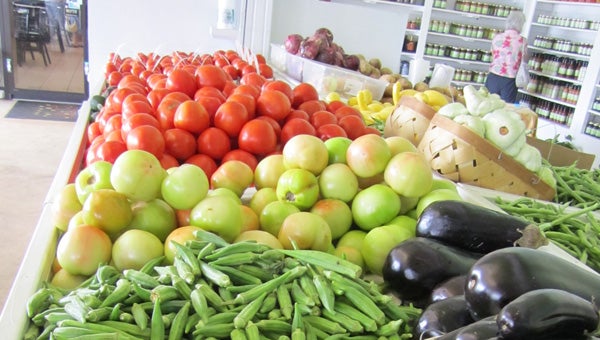
By Valerie Conner, Regional Extension Agent
“Eat your vegetables” is a regular request by most parents. Some of us think it is a rite of passage to be able to repeat that request as a parent because we heard it so often in our childhood.
The truth is that our parents were setting a firm foundation for good health with that simple demand. Good food like fruits and vegetables is among the best preventive medicines we have.
For optimum health, scientists say one should eat a rainbow of colors: blue/purple, yellow/orange, red, green and white. You can find the rainbow in a variety of foods, but most specifically, in fruits and vegetables.
Farmers’ markets are great places to start. They offer a variety of fresh, locally grown produce. There is no shortage of produce stands and markets in Chilton County. These give residents a great advantage in getting fresh-grown produce.
The U.S. Department of Agriculture (USDA) estimates that the average supermarket produce travels nearly 2,000 miles to its destination, compared to only 50 miles for farmers’ market produce.
From a nutrition standpoint, fresh is best. This is not always the easiest diet guideline to follow through the seasons, but for Chilton County residents and travelers during the summer and early fall, it can be because there is a fruit and vegetable stand or market on every major highway and some not-so-major roads.
You ask, “Why fruits and vegetables?” They are a great source of vitamins, minerals, fiber and phytochemicals, plus they are low in fat and calories.
Vitamin A keeps the eyes and skin healthy and helps protect against infections. Vitamin C helps heal cuts and wounds and keeps teeth and gums healthy.
Diets rich in dietary fiber have been shown to have a number of beneficial effects including decreased risk of coronary artery disease. Potassium rich diets help one maintain a healthy blood pressure.
Phytochemicals also occur naturally in fruits and vegetables.
Fruits and vegetables have hundreds of phytochemicals, which work together with vitamins and minerals to promote good health.
Some phytochemicals found in fruits and vegetables are carotenoids (red, yellow, and orange), lycopene (tomato-based foods), lutein and zeaxanthin (leafy greens), and flavonoids (bright colored fruits and vegetables like blueberries, strawberries and cherries).
Variety is the key. No one food can provide all the health-protecting and disease-fighting support that the body needs.
One food safety tip is that you should avoid other errands or side trips after you make your purchases at the market. Fresh food declines in quality left sitting in the car.
Also remember proper storage. Fruits and vegetables require different temperature and humidity levels.
Some foods that taste best at room temperature are melons, onions, potatoes and tomatoes. Store them in a clean, dry, well-ventilated place, away from direct sunlight. Some foods like kiwifruit, peaches, pears and plums can ripen on the counter and then stored in the refrigerator.
Most other fresh fruits and vegetables keep best stored in the refrigerator at a temperature of 40 degrees F or below.
Store fruits separately from vegetables in a crisper drawer. Fruits give off ethylene gas, which can shorten the storage life of vegetables. Also, some vegetables give off odors that can be absorbed by fruits and affect their quality.
Good nutrition is best viewed holistically. A great guideline is www.ChooseMyPlate.gov, which recommends that you fill half your plate with fruits and vegetables.
Use fruits and vegetables as snacks, and eat the right amount of calories, avoid oversized portions, make at least half your grains whole, vary your protein food choices, drink water instead of sugary drinks and be physically active.
Aim to buy foods you will eat now when they are fresh. Get the most from your local farmer’s market, and enjoy the fruits of someone else’s labor. You will not only help yourself but the local economy as well.
For more information on “Why Fruits and Vegetables,” contact the Chilton County Extension Office in Clanton.
Valerie Conner is a Regional Extension Agent in Human Nutrition, Diet and Health for the Alabama Cooperative Extension System.
